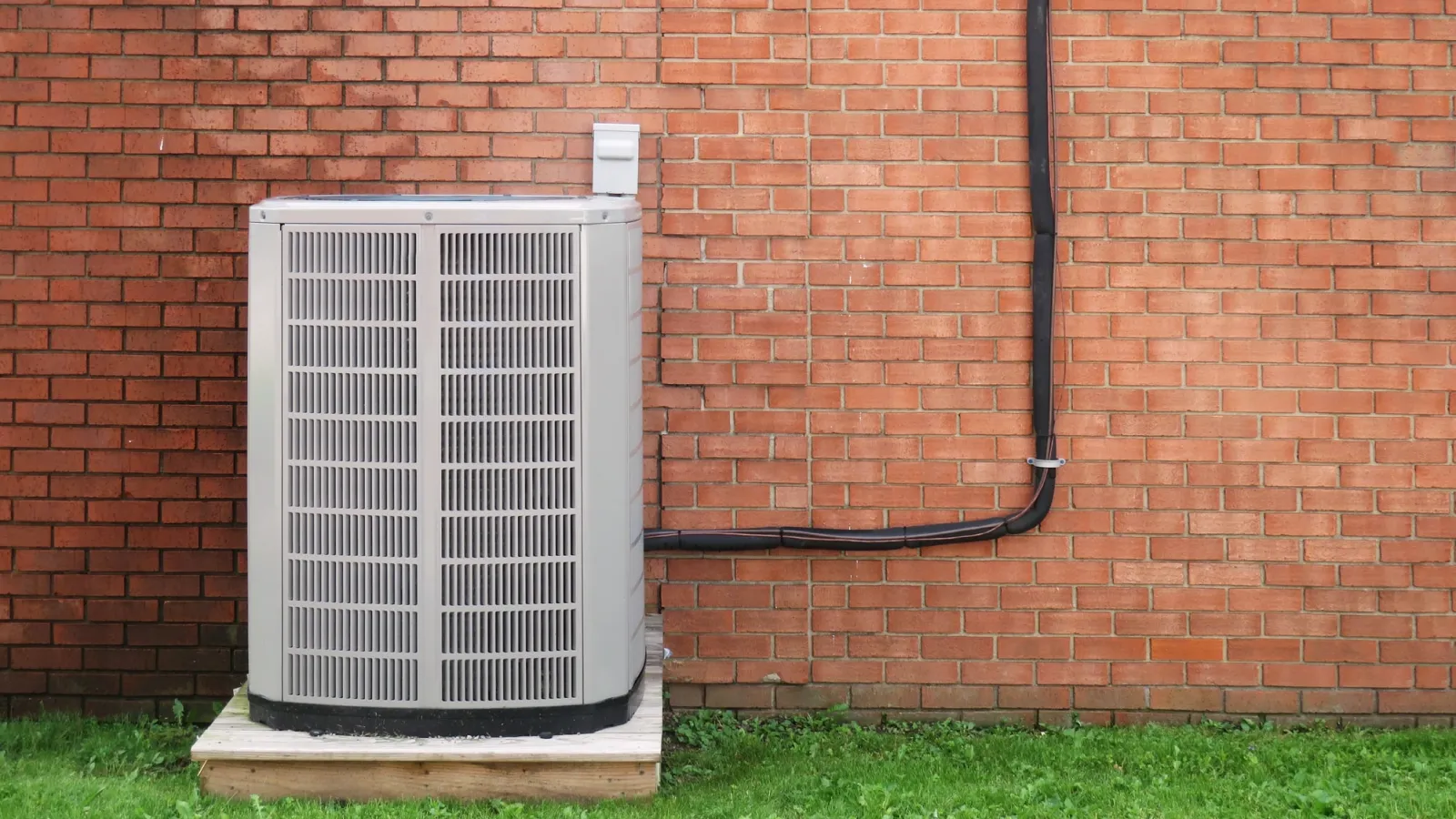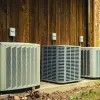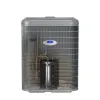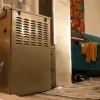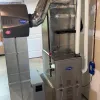When it comes to replacing a heating and air system, most homeowners have several questions.
A common one is the "package unit vs. split system" question. Which is the best system to buy-and why might you choose one over the other?
Both split and package HVAC systems are capable of heating and cooling your home, but there are differences. Depending on your home, its existing HVAC infrastructure, and your personal priorities, you might find one to be a better choice than the other.
Let's take a close look at the differences between these two types of HVAC systems. We'll cover the key differences, including advantages and disadvantages of each type.
What is a package unit HVAC system?
A package unit is a heating and cooling system in which all major components are "packaged" into a single piece of equipment. Specifically, the condenser coil, evaporator coil, furnace (if it's designed for gas heat), and blower all live inside a single unit. This unit, including both coils, is installed outside the home.
If you've ever heard of an "outdoor coil" and an "indoor coil" for an air conditioner or heat pump, that doesn't apply to package units. With these systems, both coils reside outdoors. There is an evaporator coil, but it's located outside with everything else.
Since a package unit houses all of these components in one place, it has a rather large outdoor footprint compared to split systems. However, it doesn't take up any space (aside from ductwork) under your home or in the attic.
Package units can heat and cool your home. Those that contain a furnace for heating are often referred to as "gas pack" units. But you can also get a package unit heat pump if your home isn't connected to gas lines or you don't want to use natural gas.
In the Atlanta area, package units are less common than split systems but they are still prevalent.
What is a split system?
A split system for heating and cooling consists of two primary pieces of equipment: an indoor unit and an outdoor unit.
This differentiates it from a package unit, which is a single piece of equipment.
The outdoor unit houses the system's condenser coil. The indoor unit houses the evaporator coil and the blower. Most split systems in our area contain a furnace, which is also housed inside the indoor unit.
Like package units, split systems are available as air conditioner/furnace combinations or electric heat pumps. They can cool and heat your home. Unlike package units, split systems do take up space under your home, in the attic, in the garage, or inside a utility closet. The indoor unit, as the name implies, lives somewhere indoors.
Split systems are more common in Metro Atlanta than package units. Most homes here were designed and constructed with split HVAC systems in mind.
Package unit vs. split system: Pros and cons
Homeowners might prefer a spit or package unit system for different reasons. Though they ultimately perform the same function (heating and cooling your home), there are advantages and disadvantages worth considering.
Here are a few pros and cons of each type of system.
Package unit pros
- Minimal indoor footprint: Package units take up no space inside your home. You will only need space for ductwork, which almost all homes have. This means package units are…
- Great for tight crawlspaces or attics: Sometimes, it's very difficult or impossible to fit an indoor unit inside a low-clearance attic or crawlspace. Package units give you an option for central AC and heating when your home can't accommodate a split system.
- Retrofit-friendly: Many older homes were not constructed with central, ducted HVAC systems in mind. Package units are often the best solution for retrofitting these homes for a real HVAC system.
- Ease of service: Speaking of accessibility, package units are relatively easy to service. Since all of the major components are in one place, repairs are often easier to perform-and faster.
Package unit cons
- Larger outdoor footprint: Compared to a split system with an outdoor unit, a package unit takes up more space outside your home. This isn't a problem, really, although some people may find them obtrusive.
- Less efficient: Package units are not available in the highest efficiencies for gas or heating. Carrier's highest SEER2 for a package system is 16, and its highest AFUE is 80.1%. This system has a two-compressor and two-stage gas valve.
- Noise: Since the condenser and blower are all in one place, a package unit might be louder than an otherwise comparable split system. However, newer package units are much quieter than older models, so this "con" isn't as much of a problem now as it used to be.
- More vulnerable to damage: Since package units live outdoors, they have more exposure to the elements than split systems. Parts are more likely to become damaged due to environmental conditions, weather, or even animal activity.
- Shorter equipment lifespan… sometimes: While any given package unit is just as well-made as any given split system, package units tend not to last as long due to their being installed outdoors and being more vulnerable to damage over the long-term. That being said, regular HVAC maintenance can go a long way toward mitigating those risks.
- Fewer options: Package units are restricted to limited efficiencies and feature sets. Split systems are way more common, more in demand, and offer a wider variety of features across product lines.
Split system pros
- More efficient: Compared to package units, it's possible to get a split system that's much more efficient. For example, Carrier's most efficient split system AC is a 21 SEER2 system, and its most efficient split system furnace is 98.5% AFUE.
- More options: With split systems, it's possible to choose from a much wider variety of component types. For example, you can choose a variable speed compressor and air handler, which isn't something that's typically available with package units.
- Quieter: Since the blower and outdoor coil are in separate locations, individual system components are relatively quiet. Plus, if you get a variable speed unit, the blower will usually run low and slow.
- Lower maintenance costs: Since they're not as exposed to the elements, split systems tend to require fewer service calls and repairs.
- Longer lifespan: Fewer opportunities for damage mean split systems tend to last longer, on the whole.
Split system cons
- Greater indoor space requirements: To install a split system, your home needs enough clearance for the indoor unit. This isn't always possible in very tight attics or crawlspaces.
- Complex installations: There are more separate parts and connections on split systems, so there's more opportunity for error. At PV, this isn't really a problem because our installers are highly trained and experienced; plus, we perform a rigorous quality control audit after every installation. However, not all contractors operate like this, so there's plenty of room for problems (we know because we're often called to fix other companies' mistakes).
Note: At the time of publication, the higher upfront cost of split systems is significantly offset by Georgia's energy rebate programs. Most homeowners will qualify for a major rebate for a new, energy efficient HVAC system, often saving thousands of dollars!
Should you buy a package unit or a split system?
For most homeowners, this is an easy choice.
If your current HVAC system is a split system, it's best to replace it with another split system. If your current HVAC system is a package unit, it's best to replace it with another package unit.
It's really that simple!
Over the last several decades, most homes in the Atlanta area were built to accommodate split HVAC systems. In these homes, there's plenty of space for an air handler or furnace in the crawlspace, basement, or attic. For this reason, we recommend sticking with a split system. You'll get more options for efficiency, too!
For older homes or homes that can't accommodate an indoor air handler or furnace, package units are a fantastic alternative. In fact, most homes that are best suited to these types of systems are already outfitted for them.
Typically, a house that's been constructed or retrofitted for a package unit will have a large opening on the foundation wall for both the return and supply ductwork.
For this reason, it doesn't make a lot of sense to remove the package unit and rebuild part of the foundation wall just to accommodate a split system. Even if you could fit an air handler in the crawlspace, the potential benefits likely aren't worth the expense and headache.
With only the rare exception, it's best to go with the type of system your home is already set up for.
Conclusion: Split and package HVAC systems have advantages and disadvantages
Both systems do a great job heating and cooling your home!
Where split systems have the edge in efficiency options and longevity, package units are superior when it comes to lower upfront costs and space considerations.
If you live in Metro Atlanta and have questions about replacing your heating and air conditioning system, PV Heating, Cooling & Plumbing can help!
Call us today at (404) 798-9672 or schedule an appointment online!
